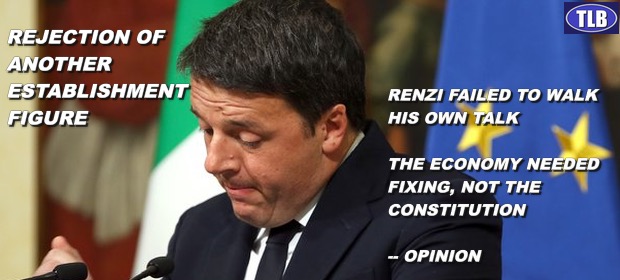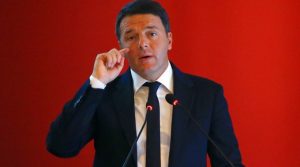
Italy referendum: ‘People don’t trust establishment, want more radical changes’
RT
Italian PM Renzi’s defeat in Sunday’s referendum, similar to Brexit and Trump’s surprise win, show that people are not happy with their government’s performance, don’t trust the elite and want more radical reforms, says Italian journalist, Marcello Foa.
The Italian Prime Minister Matteo Renzi announced his resignation on Sunday, following a substantial loss in the referendum on constitutional reform.

Italian Prime Minister Matteo Renzi © Tony Gentile / Reuters
With a turnout of around 70 percent, the final results of the poll show the No camp with almost 60 per cent support, while Yes trailed with just 40.
The referendum was Renzi’s initiative. He had proposed reforms hoping to make Italy’s parliament more stable, and to simplify the decision-making process.
“I believe that this vote, this strong result …is a vote against the government basically,” says Italian journalist Anna Mazzone. “This was a very conservative vote,” she said, adding that the majority of Italians decided not to change the constitution “according to the line, according to the thought, according to the politics of Matteo Renzi.”
“That is why he resigned, because, as he said yesterday, all this has been his own responsibility,” she added.


Mazzone argues that the majority of Italians would prefer the government to focus on other things rather than amending the constitution. The country’s economy “is suffering” she said, and “almost three million Italians” live in poverty; addressing these problems should be a priority for authorities.
“The solution could be to focus on the problems, instead of other things like the constitution, for example. This government failed because it proposed a lot of reforms like the Jobs Act,” Mazzone told RT. The labor reform proposed by Renzi was known as the Jobs Act was “not effective” in sorting the problem of unemployment as “34 percent of young Italians still cannot find a job,” she added.
Another Italian journalist, Marcello Foa, argues that Matteo Renzi, who had been very popular at the beginning of his time in office, “was promising too much” but didn’t fulfill many of his promises.
“A large part of the population doesn’t trust him anymore,” he told RT. Mainly the referendum was about people deciding between giving “this kind of prime minister” more powers and keeping unchanged “the constitution, which has been very reliable and affordable for many years,” he said.
Prime Minister Renzi was a vocal critic of the EU’s immigration and austerity policies, and called for Italy to take back control of its own finances, and urged a dialog with Russia.

In Foa’s view, while saying one thing in public, Renzi was “giving up on his stance” about such issues as immigration at “private” meetings during EU summits. The opposition, on the contrary, maintained that “Italy is receiving every day tens of thousands of immigrants, and the EU is leaving Italy alone.”
“Italy is not structured to receive so many immigrants that now tend to stay in Italy and should be distributed all over [the EU]. Some parties, like the Northern League, said we should stop the immigrants, even arriving in Italy, and should be stopped on the sea, or on the African coast. This is something that Mr. Renzi [didn’t] say. So Mr. Renzi is perceived as not very strong, not very credible on this topic,” Foa added.
The journalist drew a parallel between the Italian referendum and Brexit and the American elections earlier this year. The sentiment that made so many people in Britain vote to leave the EU and the Americans to elect Donald Trump their next president is similar to what Italian people had. They think that “the governments don’t perform well; too many people are unemployed; people lose control on their destiny,” he said.
“There is a strong feeling that people don’t trust anymore the establishment; people don’t trust anymore the elite. They want a more radical change than was promised. Mr. Renzi, himself used to propose such a radical change, but like it happened, for example, with [Alexis] Tsipras in Greece, he was not able to fulfill his promises,” Foa said.
************
ER recommends other articles by RT
 Find out about our great (WOW) TLB Project Membership package and benefits, add your voice and help us to change the world!
Find out about our great (WOW) TLB Project Membership package and benefits, add your voice and help us to change the world!




